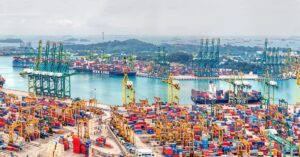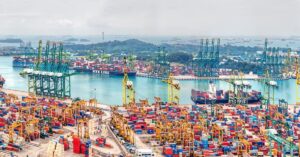
Royal Malaysian Navy Ship Sinks Entirely Off Johor Coast Due To Severe Flooding
August 26, 2024
Indian Coast Guard Rescues 11 People From Sinking Cargo Ship In A Swift Sea-Air Operation
August 26, 2024

Singapore began testing foreign seafarers for monkeypox on August 23, 2024, as part of its intensified efforts to combat the viral outbreak.
The improved measures include temperature and visual inspections at Changi and Seletar airports for inbound travellers and workers from areas at risk of monkeypox outbreaks. Similar screening techniques will be used at sea checkpoints for crew and passengers arriving by ship from affected areas.
The Singapore Ministry of Health (MOH) announced that these stricter measures are intended to improve detection and prevent the spread of monkeypox, commonly known as Mpox. The decision comes after a recent spike in monkeypox cases worldwide and the emergence of more severe variants.
Since the beginning of 2024, there has been a major increase in monkeypox infections, mainly in the Democratic Republic of the Congo (DRC).
The World Health Organization (WHO) has declared a worldwide health emergency due to a new and deadly virus variant. Sweden announced its first case of Mpox Clade I, a more dangerous and infectious variant.
As of August 22, 2024, Singapore had confirmed 13 cases of the milder Clade II strain of monkeypox but no cases of Mpox Clade I. Meanwhile, Thailand reported the first case of another dangerous variant, Mpox IB, in a 66-year-old European man.
457 deaths and nearly 14,000 cases of monkeypox have been reported globally so far this year. The outbreak is mainly centered in the Democratic Republic of the Congo, with a few cases reported in other African countries, including Pakistan, Thailand, the Philippines, and Sweden.
The World Health Organization has declared a global public health emergency due to the high death rate of some monkeypox variants.
The Singapore Ministry of Health highlighted the importance of personal responsibility and proper hygiene practices in reducing transmission risk.
Reference: Shipping Watch, Ship And Bunker
Singapore Begins Testing Foreign Seafarers For MonkeyPox At Sea Checkpoints appeared first on Marine Insight – The Maritime Industry Guide
Source: Maritime Shipping News


